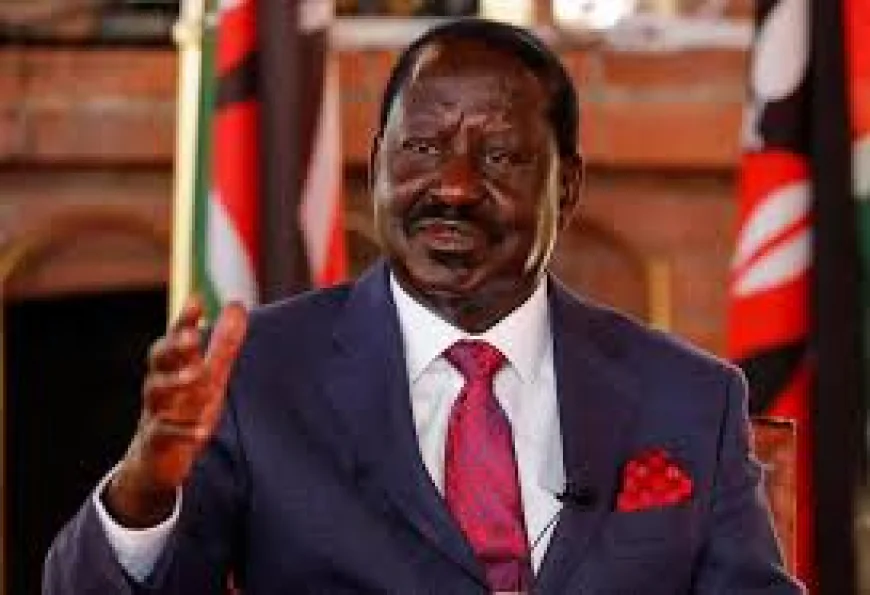Raila Odinga Dead at 80
Kenya’s veteran opposition leader Raila Amolo Odinga has died at 80, marking the closing of a political chapter that shaped Kenya’s democracy for more than four decades. From surviving detention under autocratic rule to nearly clinching the presidency five times, Odinga’s journey was one of resilience, reform, and reinvention. His death now sets off a fierce power scramble within Kenya’s opposition and raises questions about the future of the nation’s democratic trajectory.

Raila Odinga: The End of an Era — Kenya Mourns Its Fiercest Opposition Voice
Kenya woke up to heartbreaking news this week, the death of Raila Odinga, the country’s most enduring opposition figure and a man whose name became synonymous with both defiance and dialogue. Odinga died on October 15, 2025, in India following a cardiac arrest, bringing an end to an era of relentless political struggle, compromise, and reform.
A Life Forged in Resistance
Born in 1945 to Jaramogi Oginga Odinga, Kenya’s first Vice President, Raila Odinga seemed destined for politics. But his path was anything but easy. During the repressive years of President Daniel arap Moi’s one-party rule, Odinga emerged as one of Kenya’s most outspoken reformists, a man willing to pay the price for freedom.
Accused of participating in the failed 1982 coup attempt, he spent nearly a decade in detention, enduring solitary confinement and torture. Yet, he remained undeterred. His push for multiparty democracy, alongside other reformists, eventually led to the repeal of the one-party system in 1991, paving the way for a new political dawn.
Champion of Multiparty Democracy and Reformer
Elected to Parliament in 1992, Odinga quickly became a national force. His charisma, fiery oratory, and populist connection with ordinary Kenyans earned him both admiration and controversy. He contested the presidency five times — in 1997, 2007, 2013, 2017, and 2022 — often claiming electoral injustice denied him victory.
The 2007 election was the most explosive, plunging the nation into violence that left over a thousand dead. It was Odinga’s willingness to compromise that led to the 2008 power-sharing deal, where he became Prime Minister in a coalition government with President Mwai Kibaki. That uneasy truce birthed the 2010 Constitution, one of his greatest legacies, introducing devolution, stronger institutions, and enhanced rights protections.
The Handshake and His Later Years
In 2018, after another disputed election, Odinga stunned the nation with the now-famous “Handshake” with then-President Uhuru Kenyatta. The move, seen by some as an act of statesmanship and by others as betrayal, helped cool tensions and stabilize a deeply polarized nation.
Even after his defeat to William Ruto in 2022, Odinga remained a central figure in Kenya’s political discourse; a voice for reform, inclusion, and national dialogue. His alliances, shifting over time, reflected his evolving vision: that Kenya’s democracy must outlive its divisions.
A Legacy Etched in Kenya’s Democratic DNA
Raila Odinga’s contributions to Kenya are monumental:
-
Defender of Democracy: He was instrumental in ending one-party rule and pushing for civil liberties.
-
Architect of Constitutional Reform: His advocacy shaped the 2010 Constitution, a document that continues to guide Kenya’s governance.
-
Voice for the Marginalized: Odinga championed equity, devolution, and representation for communities long left behind.
-
Bridge Builder: Through power-sharing and reconciliation, he helped the nation avoid collapse at its most fragile moments.
For all his achievements, Odinga was not without controversy. Critics accused him of ethnic mobilization, populist politics, and at times, political opportunism. Yet, even his detractors acknowledge his indelible mark on the Kenyan state.
What His Death Means for Kenya’s Political Future
Odinga’s passing leaves a gaping void in Kenya’s opposition, a movement he embodied for over four decades. His Orange Democratic Movement (ODM) and the broader Azimio coalition now face a turbulent period of succession battles and reorganization.
Without Odinga’s commanding presence, the opposition risks fragmentation. President Ruto’s administration could find itself strengthened, with less organized resistance in Parliament and on the streets. At the same time, younger leaders; from governors to MPs inspired by Odinga’s defiance may see this as their moment to rise, ushering in a generational shift.
But beyond politics, his death carries emotional weight. For millions, Odinga was “Baba”, a symbol of endurance and hope, the man who never stopped believing that Kenya could be better. His absence will test the nation’s democratic maturity and the resilience of the institutions he helped build.
The Road Ahead
As Kenyans mourn, the nation must now grapple with how to preserve Odinga’s democratic legacy without his guiding voice. The coming months will reveal whether Kenya’s opposition can reorganize around a shared vision or dissolve into factional rivalries.
Raila Odinga’s life was defined by struggle, sacrifice, and survival. His death closes one chapter but the democratic ideals he fought for remain the compass by which Kenya will navigate its uncertain future.
Source:
DWTV/TheTimes


